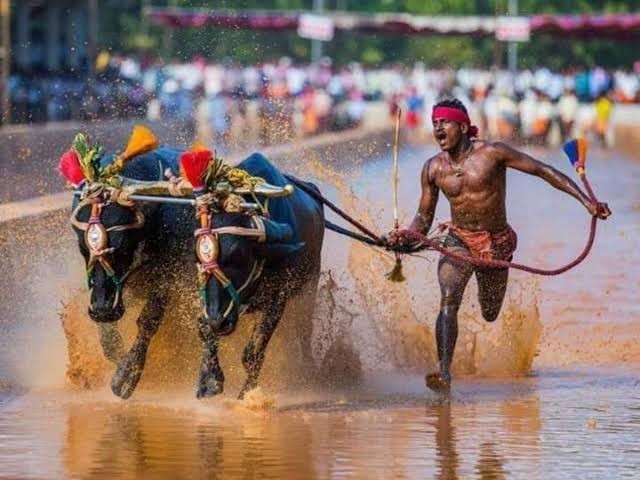
Kambala race

28.11.2023
Kambala race , Daily Current Affairs , RACE IAS : Best IAS Coaching in Lucknow
|
For Prelims: What is Kambala, Categories in Kambala For Mains paper :Why was Kambala outlawed by the Supreme Court?,How was the ban lifted? Why has Kambala been accused of caste discrimination? |
Why in the news?
Recently, Bengaluru held its first Kambala race, with 159 pairs of buffaloes and their jockeys racing through the specially made slush tracks in the city’s Palace Grounds.
Key Points
Kambala has in the past been banned by the Supreme Court. But, the Karnataka govt, keeping its popularity in mind, amended legislation to allow the races to go on.
What is Kambala?
- It is a folk sport practised in coastal Karnataka districts, especially in regions where Tulu speakers form a majority.
- In the past, races were hosted by various families and groups in sludgy fields in the days after paddy was harvested.
- Now, various Kambala Samithis or organising bodies have come up.
- These Samithis host weekly events from the end of November till the first half of April across Dakshina Kannada and Udupi districts.
Matter of pride
- Kambala is a matter of prestige for many families, especially from the Bunt community in the coastal areas.
- Pairs of buffaloes are groomed by them round the year in the hope of winning a Kambala event.
Categories in Kambala: It is generally held under four categories.
First is Negilu (plough), where light ploughs are used to tie buffaloes for the race. The event is for entry-level animals.
- The second is Hagga (rope), where buffaloes are raced by jockeys with just a rope tying the pair together.
- The third category is Adda Halage, in which jockeys stand over a horizontal plank dragged by buffaloes.
- Thus, unlike Hagga and Negilu, where jockeys run behind the animals, in this, buffaloes drag the jockeys.
- Kane Halage is the fourth category, where a wooden plank is tied to buffaloes.
- The plank, on which the jockeys stand, has two holes through which water gushes out as the plank is dragged along the slush tracks.
- The height to which water splashes determines the winner of the event.
Why was Kambala outlawed by the Supreme Court?
Various petitions filed
- Several organisations, including People for the Ethical Treatment of Animals (PETA), had filed a petition against all traditional sporting events, complaining about animal abuse.
- The complaint against Kambala was that the buffaloes’ noses are tied with a rope and the animals are whipped continuously during the race, which amounts to cruelty.
SC Judgement
- The SC, which heard these petitions, ruled to ban Jallikattu, Kambala and bullock cart racing in 2014.
- Jallikattu, also known as eruthazhuvuthal, is a bull-taming sport traditionally played in Tamil Nadu as part of the Pongal harvest festival.
- The ruling also held that bovine sports were contrary to the provisions of Sections 3, 11(1)(a) and (m) of the Prevention of Cruelty to Animals Act, 1960.
- These sections relate to the duties of persons having charge of animals and define animal cruelty
How was the ban lifted?
- 2016 notification by the MoEF&CC allowing Jallikattu, Kambala and Bullock Cart Races in other parts of India
- In January 2016, a notification was issued by the Ministry of Environment, Forest and Climate Change (MoEF&CC) prohibiting the exhibition or training of bulls as performing animals.
- However, an exception was carved in the notification.
- The exception specified that bulls might still be trained as performing animals at events such as Jallikattu in Tamil Nadu and Bullock Cart Races in Maharashtra, Karnataka, Punjab, Haryana, Kerala and Gujarat according to the customs and culture of different communities.
- This exception was made subject to certain conditions aimed at reducing the suffering of the animals being used for such sports.
- Amendments brought by the respective state governments
- At the same time, state governments amended provisions of the Prevention of Cruelty to Animals Act to provide an exemption for these events.
- Though this was challenged, a five-judge Constitutional Bench upheld the amendments made by Karnataka, Tamil Nadu, and Maharashtra in May 2023.
Why has Kambala been accused of caste discrimination?
- Historically, members of the Koraga community, once considered untouchable, were ill-treated before the festival kicked off, with some even made to race instead of the buffaloes.
- Today too, critics argue, the sport is controlled by dominant caste groups while those considered lower caste end up doing menial jobs during the event.
Source:Indian Express